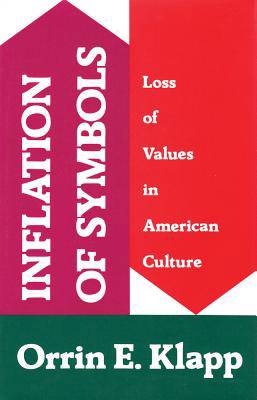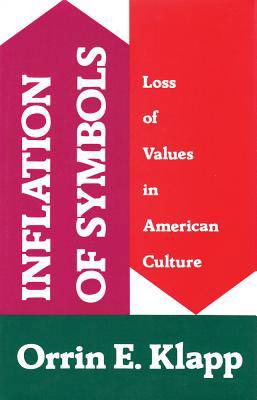
- Afhalen na 1 uur in een winkel met voorraad
- Gratis thuislevering in België vanaf € 30
- Ruim aanbod met 7 miljoen producten
- Afhalen na 1 uur in een winkel met voorraad
- Gratis thuislevering in België vanaf € 30
- Ruim aanbod met 7 miljoen producten
Zoeken
€ 195,45
+ 390 punten
Omschrijving
Today Americans are used to keeping tabs on inflation through the use of price indexes and interest rates, and to restraining it through the use of Federal Reserve monetary policy. No tabs, however, are kept on other kinds of inflation, of symbols other than money. Klapp looks into what the inflation of value might mean and how it occurs in social relations, popular culture, mass contagions, fads and fashions, even smiles and kisses.In Klapp's view, symbolic or cultural inflation applies to all social processes in which enlargement, expansion, or oversupply leads to the diminishing of value of a symbol. Its symptoms have been noted in the arts, in communications, and in politics, but there have been few, if any, attempts to analyze the mechanism by which such inflation occurs. The author attempts such an analysis, structuring it around those mechanisms he terms "social magnifiers."On the simplest level, there is mere overstatement, the exaggeration of claims that lose credibility as the reality is seen to fall short. More socially complex are types of magnifiers that involve shared cultural values and large groups of people. These include "crusading," the rhetorical inflation of a conflict into a war of good versus evil; emotional contagion, which through uncritical suggestibility draws large numbers of people into actions that exaggerate value; and self-expansion through identification with others, the vicarious triumphs and careers of heroes and celebrities, a process Klapp terms "emotional hitchhiking. "Finally, there is the market-like type of cultural inflation in which oversupply of a symbol leads to a weakening of its power to elicit desired responses. Klapp demonstrates how this market concept applies to such symbols as credentials, medals, smiles, kisses, greeting cards, religious tokens, fashions, and finally to information itself.The result of Klapp's study is to bring into focus this vast, pervasive, largely unwitting sort of inflation that eats away at cultural values that carry no price in the money market and to isolate various conditions - massness, egalitari-anism, loss of scarcity - that favor social inflation and thereby help us to understand (even to control?) it as a source of disappointment in modern society. This book will be of interest to sociologists, economists, and students of American culture concerned with the erosion of values in an information age.
Specificaties
Betrokkenen
- Auteur(s):
- Uitgeverij:
Inhoud
- Aantal bladzijden:
- 208
- Taal:
- Engels
Eigenschappen
- Productcode (EAN):
- 9780887383854
- Verschijningsdatum:
- 30/01/1991
- Uitvoering:
- Hardcover
- Formaat:
- Genaaid
- Gewicht:
- 521 g

Alleen bij Standaard Boekhandel
+ 390 punten op je klantenkaart van Standaard Boekhandel
Beoordelingen
We publiceren alleen reviews die voldoen aan de voorwaarden voor reviews. Bekijk onze voorwaarden voor reviews.











